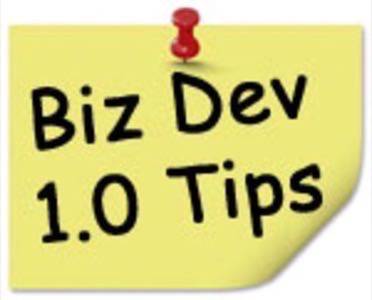ReadWriteWeb’s Alex Iskold recently described modern Biz Dev 2.0 techniques that do not involve knocking on doors and talking to people. The Internet is great at automating routine transactions and more software is being sold as a service on a simple “click here” to subscribe basis. But occasionally some contact sport is still required, and you have to resort to what we can now call Biz Dev 1.0 — what we used to call selling. You will need these skills to raise money and to sell your business, even if you never have to sell to anybody else. Fred Wilson reminded us of the most basic requirement, to ask for the order. Here are 10 other tips:

- Close on every call. Whether your call is by email, phone or face-to-face, have one single objective that you can close. It might be “please sign here,” it might be “will you have lunch with me next Tuesday?”
- Expect mutual effort. A sure sign of spinning your wheels is when you make all the effort and the buyer/investor does nothing. Ask them to do something to indicate some level of interest. If you don’t see this, move onto the next prospect.
- Wait until you hear the screams. If you have a fire engine, you are not needed until the house is on fire. The best sales people wait until they see a real need before applying a lot of effort. One way to judge this, of course, is via #2.
- Two ears, one mouth. If you only learn one lesson, this is it. This is particularly hard for technically oriented entrepreneurs with a deep passion for their product. People don’t buy products, they buy solutions to problems. Find the problem and show a solution based on your product. Ask lots of open-ended questions. People are much, much better at talking themselves into buying than you will ever be at talking them into buying.
- Talk about the weather. This a lesson that I learned the hard way. Just as the buyer was about to sign, I said something that prompted a question that was critical and for which I did not have a good answer. The next day something happened, totally outside my control, that put the deal on indefinite hold. When somebody is about to sign, be quiet and if silence is uncomfortable find something banal to talk about.
- Imagine the press conference. This is a good way to focus on the one thing that really matters to your buyer. What would the buyer tell the world about your deal? Assuming the usual attention deficit, this will be one simple point. Focus relentlessly on that one thing.
- Recognize the emotional tipping point. Selling is a contact sport. You cannot do it by email or phone alone. Even in a long, complex sales cycle with multiple people in a decision team, there is one person who really matters and one moment when that person says to themselves, “I am going to do this.” Everything before that moment is preparation and everything after is clearing due diligence.
- Stomach knots, table banging, and other good signs. These agita moments show both parties that the negotiating is nearing the end. It reassures them that they are not leaving money on the table. Of course, good negotiators can fake it, and watching that can be pretty amusing. (Is that what we are witnessing in the on-again off-again Microsoft/Yahoo! negotiations?)
- Don’t take it personally. Look at every rejection as a learning experience. Really. Even if you think the guy was a jerk/idiot. If he is a jerk/idiot, how do you recognize jerks/idiots earlier so that you waste less time? More likely you did not do #2, #3, or #4 properly. In other words, it was not a good fit and he was not a jerk/idiot.
- Measure face-to-face time. Biz Dev 1.0 is a contact sport. Email and phone is great for details and follow-up, but selling happens face-to-face. Always has, always will. So measure face time. But also remember #1, close on every call. Just socializing can be good to build some warmth in the relationship but my rule is that respect is essential, liking is optional.
- Ask for the order. Fred Wilson articulated this well (and the comments are worth reading).
Even if you hire sales people to sell your product/services and M&A advisers to sell your company, some of these Biz Dev tips are likely to come in handy at some stage. Do you have any other tips? Post them in the comments.

















